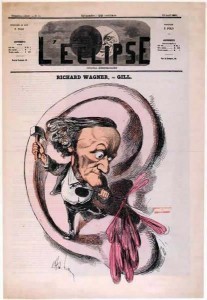 Mosaic, the online magazine of Jewish thought, recently published an important essay by Nathan Shields called “Wagner and the Jews” that has caused much discussion. The editors invited Ed Rothstein and me to respond to the piece. My response is out today.
Mosaic, the online magazine of Jewish thought, recently published an important essay by Nathan Shields called “Wagner and the Jews” that has caused much discussion. The editors invited Ed Rothstein and me to respond to the piece. My response is out today.
Here’s an excerpt:
In one of those grisly juxtapositions that are so characteristic of life under the aspect of postmodernity, my first reading of “Wagner and the Jews” was interrupted by the breaking news of the Charlie Hebdo massacre and its aftermath, a second massacre in a Paris kosher supermarket. The smoke had hardly cleared before a prominent British newspaper was publishing a story that started off like this: “More than half of British Jewish people fear Jews have no future in the UK, according to a new study which also reveals that anti-Semitic sentiments are more prevalent than widely believed.” Stephen Pollard, editor of the Jewish Chronicle, had already informed the world that “every French Jew I know has either already left or is working out how to leave.” Europe, it would seem, is well on the way to becoming—to use a term favored by Richard Wagner’s most prominent admirer—Judenfrei.
Hence the uncanny timeliness of “Wagner and the Jews,” in which Nathan Shields takes a searching and persuasive look at the ways in which Wagner’s operas embody his anti-Semitic obsessions. The human capacity for self-deception is and will always be infinite, but I cannot imagine that any lover of Wagner’s music who reads Shields’ essay with an open mind will thereafter find it possible to erect a cordon sanitaire separating the composer’s operas from his ideas. They are consubstantial, as he meant them to be, and those who think otherwise are ignoring the self-evident assertions of their creator, who believed his work to be the New Testament of a religion of art…
Especially in the wake of the Charlie Hebdo massacres, the contemporary parallel with the identically all-encompassing fanaticism of radical Islam is impossible to ignore. The history of the twentieth century, as Shields reminds us, was a history of political Gesamtkunstwerken, a succession of failed totalities, one of which was brought into being by a painter manqué who took care to assure the world that “I became a politician against my will. If someone else had been found, I would never have gone into politics; I would have become an artist or a philosopher.” So, too, is radical Islam just such a totality, a monolith in which both the personal and political are religious. Like Hitler and like Wagner before him, the mullahs are deranged idealists who hate the world as it is and wish to make it over again. They come as saviors and offer us redemption, and in return all we need do is surrender our selves….
Read the whole thing here.
